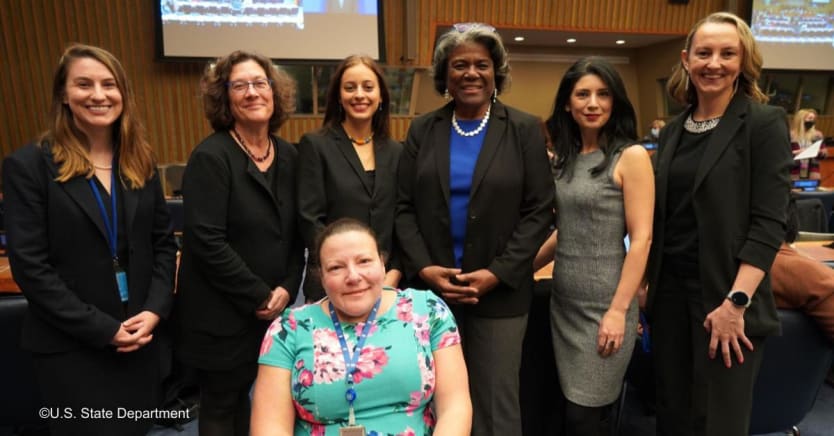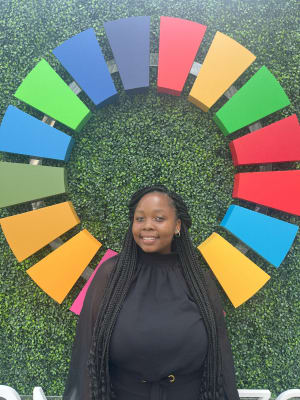
Many organizations are eager to invite young people to attend events, speak on panels, or represent their causes. But they often have not taken the time to consider what it means to engage youth meaningfully and safely, and they underestimate the preparation it takes. Simply putting a young person's voice on a panel alongside politicians, experts, and government officials isn't equity; it's merely inclusion, or at worst, tokenism. True equity means ensuring everyone has the time, support, and opportunities they need to make their points and influence decision-making.
We have all experienced that awkward, gut-wrenching feeling of walking into a professional setting where we don't know anyone and have no idea what to do next. Do we muster up the courage to strike up a conversation with a stranger? Or do we resort to scrolling through our phones, hoping someone will break the ice?
“When entering a change-making space it’s natural for doubts and immense uncertainty to creep in … Plan International prepared me … to be my full self instead of superimposing what they thought I needed.”
— Luna Abadía, a 19-year-old U.S. public delegate to the 67th session of the Commission on the Status of WomenNow, imagine yourself at just 18 years old, thrown into that same scenario but without previous professional experience to rely on. Maybe you don’t know anyone, you've never been to the country before, or no one is speaking in your native language. To top it all off, the heavy usage of acronyms and jargon is confusing and easily misunderstood.
This is the reality for many young people invited to prestigious forums. On the one hand, it’s an exceptional opportunity to make their voice heard and they're grateful to attend. But on the other hand, they're faced with intense pressure to make a meaningful impact. If, in addition, they haven’t received the necessary training, support, or understanding of how to navigate these environments, the result can be a letdown for everyone.

I’ve witnessed instances where adultism — bias against young people, discounting their views, opinions, and experiences — is all too obvious. This includes panels where young speakers weren't even provided with a literal seat, while the adult speakers received a seat, microphone, and plaque displaying their name and title. Following major events, I have heard horror scenarios where young people were invited to attend an event but not provided with adequate housing or food stipends. In these cases, it rises beyond a youth-inclusion issue and becomes a protection and safeguarding concern as well. Risky scenarios like this, and other unfortunate disparities, are preventable with preparation.
“When entering a change-making space it’s natural for doubts and immense uncertainty to creep in … Plan International prepared me, briefed me and empowered me to be my full self instead of superimposing what they thought I needed," Luna Abadía, age 19, a U.S. public delegate to the 67th session of the Commission on the Status of Women, said.
Here are the primary considerations organizations should take before, during, and after events to set yourself and the young people you’re working with up for success.
Before:
1. Conduct a thorough risk assessment identifying potential harms a young person might encounter and create a plan on how you'll mitigate those harms.
2. Clearly define a scope of work for the young person to ensure that they know exactly what to expect.
3. Arrange convenient accommodation nearby. It is not acceptable for a young person to navigate more than an hour of on-the-ground travel to attend or participate in a conference — especially if you wouldn’t ask your executives to do the same.
4. Provide comprehensive context for the environment, including review terminology and key messages, history, and background context information. This briefing should be reflective of how you prepare an executive for a similar type of engagement.
5. Research logistics, including passes, visas, and other required documents that may be needed, and help the young person navigate, apply, and pay for these items.
6. Consider other social and cultural factors and have a plan in place to address things such as language translation, official letters to miss school, compensation for their expertise and any missed work income, and family obligations.
During:
1. Ensure that young people have a designated chaperone, and for those under the age of 18, have the chaperone accompany them everywhere to address any safeguarding issues and emergencies.
2. Provide travel stipends covering local transportation costs and per diem stipends for meals upfront. You cannot assume young people can front-load money.
3. Schedule adequate breaks and moments for rest and restoration. Conferences are exhausting! All of us, young people included, need time to refresh to do our best work, especially when getting used to a new environment. Also consider making space for the young person to sightsee the location you are in so they can go home having experienced more than just the inside of the conference room.
After:
1. Maintain ongoing communication around any follow-up collaboration. Following up after an event can be tricky to navigate, and providing young people with the skills to do this effectively will help them build lasting connections, as well as understand boundaries.
2. Solicit feedback from the young person to improve your future engagements and schedule a debrief call for one to three months afterward to review the impact of their engagement.
3. Follow up on any media or social media materials to ensure the young person approves how their images and words are portrayed.
The voices of young people matter. They may need guidance on how to navigate the ever-changing political climate and the nuances of the business or political world, but they deserve a seat at the table with the same respect, credit, compensation, and dignity that is inherently given to the adults sitting next to them. Equitable, full, and meaningful participation of youth should be the goal every time.
Learn more about the ways Plan International meaningfully engages young people in governance, advocacy, and fundraising here.
Search for articles
Most Read
- 1
- 2
- 3
- 4
- 5








